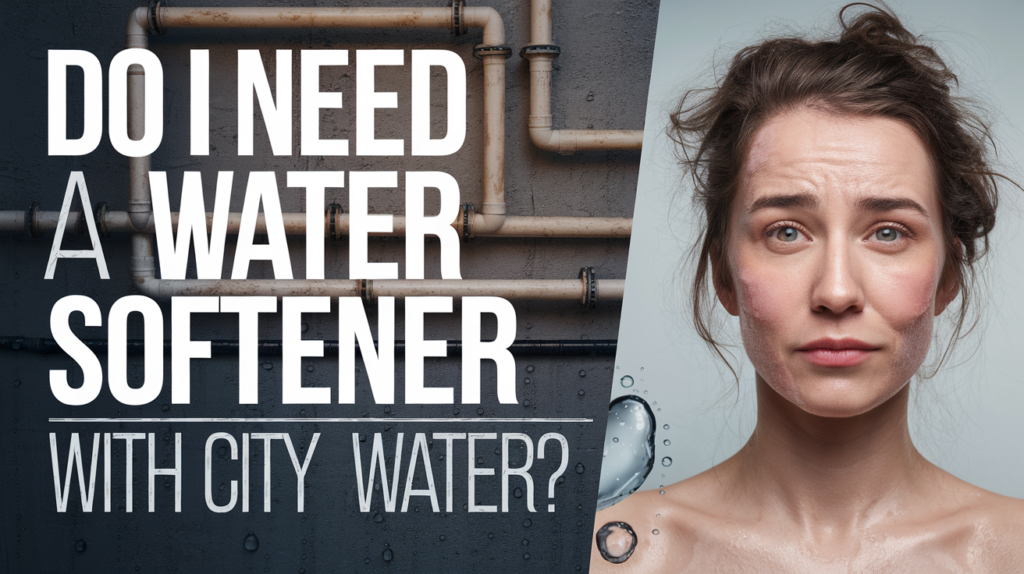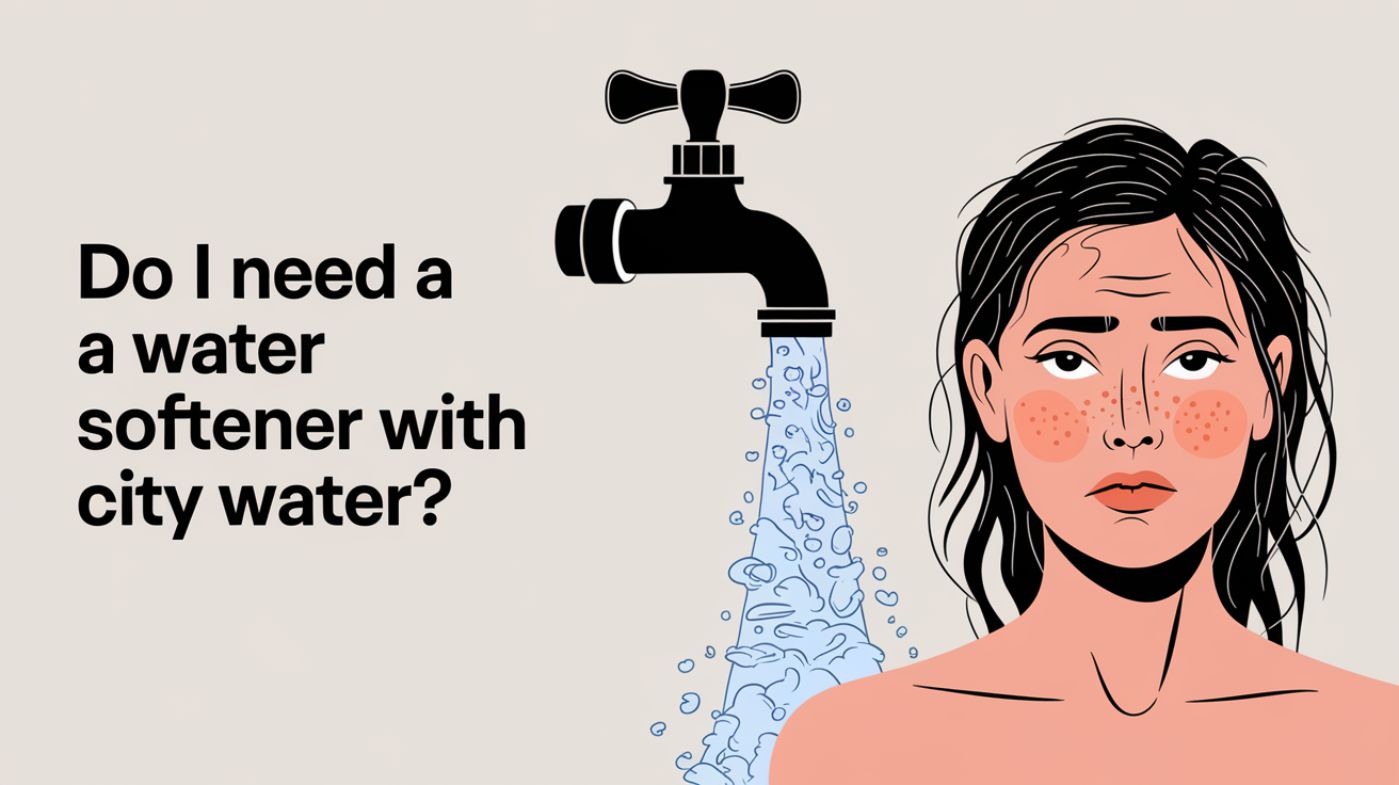Water is vital to our daily lives, and its quality directly impacts our health, comfort, and the efficiency of our appliances. As urbanization increases, many households rely on city water supplies for their daily needs. However, city water often comes with its own set of challenges, including hardness levels that may necessitate a water softener.
This article will delve into the question of whether you need a water softener with city water, discussing its effects, benefits, and how 3D Aqua Water Treatment Company, a leading provider in India, can help improve your water quality.
Understanding City Water

What is City Water?
City water, also known as municipal water, is supplied by local government entities or water utilities. It is treated and distributed through a network of pipes to homes and businesses. The quality of city water can vary based on several factors, including:
- Source: City water may come from rivers, lakes, groundwater, or reservoirs.
- Treatment Process: Water treatment involves several processes, including filtration, disinfection (often with chlorine), and sometimes fluoridation.
- Geographical Location: The mineral content and quality of source water can vary widely between different regions.
Is City Water Hard?
Water hardness is primarily caused by dissolved minerals, particularly calcium (Ca²⁺) and magnesium (Mg²⁺). While some municipalities have soft water, many areas have city water that is classified as hard to very hard. You can often find water hardness levels in the annual water quality report published by your local water utility.
How to Test for Hard Water
To determine if your city water is hard, you can:
- Check Local Water Quality Reports: Many water utilities provide annual reports that include water hardness levels.
- Use Home Test Kits: Available at home improvement stores, these kits typically come with strips that change color based on hardness levels.
- Professional Testing: For the most accurate measurement, consider hiring a water testing service.
Effects of Hard Water
1. Impact on Appliances
Hard water can significantly affect household appliances:
- Water Heaters: Scale buildup from hard water can reduce efficiency, leading to increased energy costs and potential appliance failure.
- Dishwashers: Hard water can leave spots on glassware and lead to mineral buildup inside the machine.
- Washing Machines: Clothes washed in hard water may feel stiff and look dingy, as minerals can accumulate in fabrics.
2. Plumbing Issues
Over time, hard water can lead to problems in plumbing systems:
- Clogged Pipes: Mineral deposits can build up, narrowing pipes and reducing water flow.
- Increased Maintenance Costs: Frequent clogs and leaks can lead to higher repair bills.
3. Skin and Hair Health
Hard water can also affect personal grooming:
- Skin: It may strip natural oils, leading to dryness and irritation.
- Hair: Washing hair in hard water can make it feel rough and unmanageable due to mineral deposits.
4. Cleaning Challenges
Hard water makes cleaning more difficult:
- Soap Scum: It reacts with soap to form a sticky residue, making it harder to clean surfaces.
- Laundry Issues: Detergents may not lather effectively, resulting in less effective cleaning.
Benefits of Using a Water Softener
1. Enhanced Appliance Longevity
By reducing scale buildup, a water softener can help appliances function more efficiently and last longer.
2. Improved Cleaning Efficiency
Soft water allows soaps and detergents to lather better, making them more effective for cleaning dishes, clothes, and skin.
3. Healthier Skin and Hair
Soft water is less irritating to the skin and hair, resulting in improved hydration and texture.
4. Reduced Plumbing Issues
By minimizing mineral buildup, water softeners can help maintain water flow and decrease the frequency of plumbing repairs.
5. Cost Savings
While there is an initial investment in a water softener, the long-term savings on energy bills and appliance repairs can outweigh this cost.
Do You Need a Water Softener with City Water?
Considerations Before Making a Decision
- Water Hardness Levels: If your city water hardness is above 120 ppm (7 gpg), you might benefit from a water softener.
- Local Water Quality: If your city is known for hard water, you are likely experiencing its negative effects.
- Household Size and Usage: Larger households with higher water usage may benefit more from a water softener.
- Specific Concerns: If you or family members have sensitive skin or hair, a water softener can provide noticeable benefits.
Signs That You Might Need a Water Softener
- Frequent buildup of soap scum in bathrooms and kitchens.
- Stiff or dingy laundry after washing.
- Dry, itchy skin or dull hair.
- Clogged plumbing fixtures or reduced water pressure.
Alternatives to Water Softeners
If you’re unsure about investing in a water softener, consider these alternatives:
- Shower Filters: These devices can reduce chlorine and some minerals but may not effectively soften water for your entire home.
- Chemical Softening Agents: Products like sodium hexametaphosphate can help temporarily soften water but may not be suitable for long-term use.
- Descaling Devices: Magnetic or electronic descalers claim to prevent scale buildup but do not remove hardness minerals.
The Role of 3D Aqua Water Treatment Company
When it comes to selecting a water softener or other water treatment solutions, 3D Aqua Water Treatment Company is a top choice in India. With over 25 years of experience, they provide a wide range of products and services tailored to various water treatment needs.
Why Choose 3D Aqua?
- Expertise: Their extensive experience ensures knowledgeable advice and high-quality products tailored to your needs.
- Comprehensive Solutions: From water softeners to reverse osmosis systems and sewage treatment plants, 3D Aqua offers various solutions suitable for residential, commercial, and industrial applications.
- Nationwide Coverage: 3D Aqua serves clients throughout India, making their high-quality water treatment solutions accessible to all.
- Customer Support: Their dedicated team is committed to providing excellent customer service, from initial consultations to ongoing support.
For more information about their products and services, you can contact 3D Aqua at 89630 89630, email info@3daqua.in, or visit their website at 3DAqua.
Types of Water Softeners
If you decide to invest in a water softener, understanding the different types can help you make an informed choice:
1. Salt-Based Water Softeners
These are the most common type and use sodium ions to replace calcium and magnesium ions in hard water through a process called ion exchange.
Pros:
- Effective at reducing hardness.
- Generally low maintenance.
Cons:
- Adds sodium to your water, which may be a concern for some people.
- Requires regular salt refills.
2. Salt-Free Water Softeners
These systems condition water without removing hardness minerals, using various technologies to prevent scale buildup.
Pros:
- Does not add sodium to water.
- Requires less maintenance.
Cons:
- May not be as effective for hard water removal.
- Performance varies based on water conditions.
3. Dual-Tank Water Softeners
These systems use two resin tanks, allowing for continuous softening even during regeneration cycles.
Pros:
- Continuous supply of softened water.
- More efficient for larger households.
Cons:
- Higher initial cost and installation complexity.
4. Whole House Systems
These systems treat all the water entering your home, providing soft water for bathing, cooking, and cleaning.
Pros:
- Consistent water quality throughout the home.
- Convenient for families.
Cons:
- Higher upfront investment.
- Requires space for installation.
Maintenance of Water Softeners
Proper maintenance is essential for optimal performance. Here are some tips:
1. Regular Salt Checks
Monitor salt levels in the brine tank and refill as needed to ensure effective operation.
2. Periodic Maintenance
Schedule regular maintenance checks to keep the system running smoothly. This may include cleaning the resin tank and inspecting for leaks.
3. Water Testing
Occasionally retest your water quality to monitor hardness levels and make necessary adjustments to the system.
4. Be Aware of Environmental Impact
While water softeners provide many benefits, they can introduce sodium into the wastewater, which may have environmental implications. Consider alternative methods if this is a concern.
Environmental Considerations
When deciding on a water softener, consider the environmental impact:
- Sodium Levels: Water softeners can increase sodium levels in wastewater, affecting soil and plant health.
- Salt-Free Options: If environmental concerns are paramount, look into salt-free systems that condition water without adding sodium.
Conclusion
Whether you need a water softener with city water depends on various factors, including water hardness levels, local water quality, and personal preferences. If you frequently experience the negative effects of hard water, investing in a water softener could lead to improved appliance performance, better cleaning efficiency, and enhanced personal care.
3D Aqua Water Treatment Company is a trusted partner in addressing water quality issues in India. Their extensive range of products and exceptional service can help you make the best choice for your home or business. For more information, contact 3D Aqua at 89630 89630, email info@3daqua.in, or visit their website at 3DAqua. Investing in quality water treatment solutions is a step toward a healthier, more efficient home.

